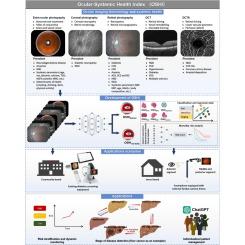Transformative applications of oculomics-based AI approaches in the management of systemic diseases: A systematic review
IF 11.4
1区 综合性期刊
Q1 MULTIDISCIPLINARY SCIENCES
引用次数: 0
Abstract
Background
Systemic diseases, such as cardiovascular and cerebrovascular conditions, pose significant global health challenges due to their high mortality rates. Early identification and intervention in systemic diseases can substantially enhance their prognosis. However, diagnosing systemic diseases often necessitates complex, expensive, and invasive tests, posing challenges in their timely detection. Therefore, simple, cost-effective, and non-invasive methods for the management (such as screening, diagnosis, and monitoring) of systemic diseases are needed to reduce associated comorbidities and mortality rates.Aim of the review
This systematic review examines the application of artificial intelligence (AI) algorithms in managing systemic diseases by analyzing ophthalmic features (oculomics) obtained from convenient, affordable, and non-invasive ophthalmic imaging.Key scientific concepts of review
Our analysis demonstrates the promising accuracy of AI in predicting systemic diseases. Subgroup analysis reveals promising capabilities of oculomics-based AI for disease staging, while caution is warranted due to the possible overestimation of AI capabilities in low-quality studies. These systems are cost-effective and safe, with high rates of acceptance among patients and clinicians. This review underscores the potential of oculomics-based AI approaches in revolutionizing the management of systemic diseases.

基于视觉组学的人工智能方法在系统性疾病管理中的变革性应用:系统综述
背景心脑血管疾病等系统性疾病死亡率高,对全球健康构成重大挑战。早期识别和干预系统性疾病可大大改善预后。然而,诊断全身性疾病往往需要进行复杂、昂贵和侵入性的测试,这给及时发现疾病带来了挑战。因此,需要简单、经济、无创的方法来管理(如筛查、诊断和监测)系统性疾病,以减少相关的并发症和死亡率。本综述的目的本系统性综述通过分析从方便、经济、无创的眼科成像中获得的眼科特征(眼科组学),研究了人工智能(AI)算法在管理系统性疾病中的应用。亚组分析显示,基于眼科成像的人工智能在疾病分期方面具有良好的能力,但由于低质量研究可能高估了人工智能的能力,因此需要谨慎。这些系统既经济又安全,在患者和临床医生中的接受度很高。本综述强调了基于视觉组学的人工智能方法在彻底改变系统性疾病管理方面的潜力。
本文章由计算机程序翻译,如有差异,请以英文原文为准。
求助全文
约1分钟内获得全文
求助全文
来源期刊

Journal of Advanced Research
Multidisciplinary-Multidisciplinary
CiteScore
21.60
自引率
0.90%
发文量
280
审稿时长
12 weeks
期刊介绍:
Journal of Advanced Research (J. Adv. Res.) is an applied/natural sciences, peer-reviewed journal that focuses on interdisciplinary research. The journal aims to contribute to applied research and knowledge worldwide through the publication of original and high-quality research articles in the fields of Medicine, Pharmaceutical Sciences, Dentistry, Physical Therapy, Veterinary Medicine, and Basic and Biological Sciences.
The following abstracting and indexing services cover the Journal of Advanced Research: PubMed/Medline, Essential Science Indicators, Web of Science, Scopus, PubMed Central, PubMed, Science Citation Index Expanded, Directory of Open Access Journals (DOAJ), and INSPEC.
 求助内容:
求助内容: 应助结果提醒方式:
应助结果提醒方式:


